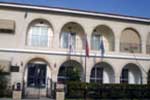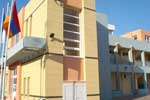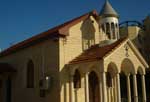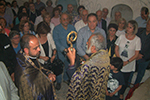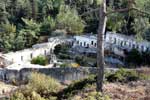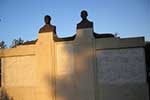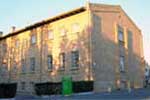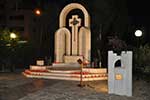Η Στήλη του Σασσουνιαν

96 YEARS LATER, TURKEY STILL PAYS A PRICE FOR GENOCIDE DENIAL
Almost a century after the fact, theRepublicofTurkeycontinues to be disgraced for its persistent denial of the Armenian Genocide.
During his visit toArmeniaearlier this month, French President Nicolas Sarkozy condemnedTurkeyby declaring that 96 years is long enough forAnkarato come to terms with its genocidal crimes. He also threatened to pass a law punishing denial of the Armenian Genocide, unlessTurkeyrecognized it in the near future.
Rather than heeding Pres. Sarkozy’s sound advice, Turkish leaders retaliated by attacking him and insulting his country. Here are some of their rejectionist statements:
- Prime Minister Erdogan: "He should first listen to his own advice. He is different inFrance, different inArmenia, and more different inTurkey. There cannot be a political leader with so many faces. Politics requires honesty…. You should know thatTurkeyis not an easy bite to swallow."
- Foreign Minister Davutoglu: "Franceshould confront its own history. I consider such remarks as political opportunism."
- Turkey’s European Union Minister Egemen Bagis: "If Sarkozy worked on how his country could come out of economic turbulence instead of assuming the role of a historian, it would be more meaningful forFranceandEurope."
- Devlet Bahceli, leader of the opposition Nationalist Movement Party (MHP): The French President is a "rude and ill-mannered" man. "Our advice to Sarkozy is that if he wants to see an example of genocide, he should look back at his history. He will clearly see the atrocities committed inAlgeriaand will notice explicit or implicit massacres inNorth Africa."
The Turkish attacks onFranceincluded demonstrations in front of the French Consulate inIstanbullast week, where protesters carried portraits of Pres. Sarkozy with Adolph Hitler’s mustache and denounced alleged crimes committed byFrancein the Algerian war.
Uncharacteristically, Turkish officials did not go beyond mere words to denounce Pres. Sarkozy’s statements on the Armenian Genocide. Missing were the customary recall of the Turkish Ambassador and threats to boycott French goods. There was no bite in their bark!
The French President was unfazed by the Turkish outbursts. Upon returning toParis, he sent a letter to Pres. Serzh Sargsyan reconfirming his earlier statements inArmenia: "Rest assured thatFrancewill not cease its commitment, as long as the massacres have not been properly recognized by the descendents of the perpetrators." Pres. Sarkozy went on to state that he was "most of all deeply moved at the Genocide Memorial Monument while paying tribute to the memory of the victims of the death sentence carried out against your people on April 24, 1915." When the French President learned of the angry Turkish reaction to his statements inYerevan, he told his aides that he had no regrets: "The Turks have always hated me, so it’s no problem."
Some French Parliamentarians were incensed, however, upon hearing that Prime Minister Erdogan had accused Pres. Sarkozy of being two-faced. They greeted the Turkish leader’s insulting words with loud and derisive exclamations in the French Parliament.
Former Ambassador Omer Engin Lutem expressed his concern that if Francewere to ban denial of the Armenian Genocide, it would trigger other European countries to follow suit. He cautioned the Turkish public that such a development on the eve of the 100th anniversary of the Armenian Genocide would constitute a significant victory for Armenians.
Murat Belge, an outspoken Turkish human rights activist, took issue with the negative reaction of his country’s leaders. He boldly condemned all those who claimed that "Turks are good people; we do not kill or commit genocide." Such statements are "slanderous," Belge stated.
Another prominent scholar and columnist, Ahmet Insel, rebuked Prime Minister Erdogan for telling Pres. Sarkozy to look atFrance’s own colonial past. Insel wondered if Erdogan would indeed recognize the Armenian Genocide ifFrancefaced its own history? And what wouldTurkeydo if the same suggestion came from a country that did not have dark pages in its history? Insel observed that this is the same Prime Minister who was claiming that all Ottoman archives are open, as his government was blocking the posting of these documents on the Internet.
As an Iranian diplomat recently noted: "The Armenian Genocide is a Damoclean Sword hanging overTurkey’s head." Sooner or later, a wise Turkish leader would come to realize that acknowledging the Armenian Genocide is more beneficial toTurkeythan its continued denial.
By Harut Sassounian
Publisher, TheCaliforniaCourier






